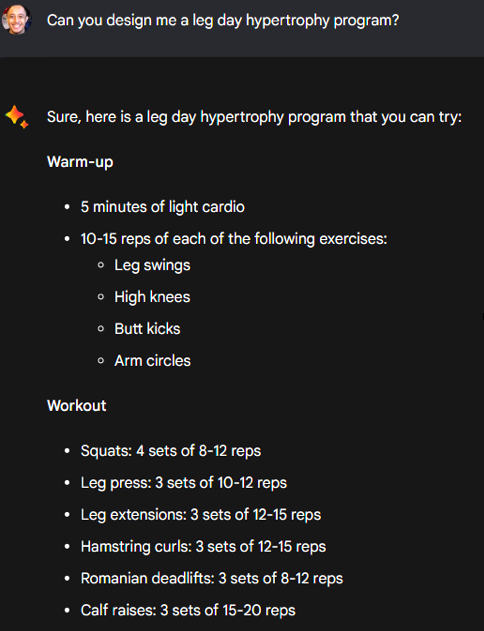AI can now help with a lot of things, but can it also be a shortcut to gains?
Photo by Getty Images via Unsplash+
Artificial intelligence (AI) bots have now been a big household talking point for around a year now, especially with models such as ChatGPT warping the academic and creative fields negatively. The reason they’ve become so popular is that anyone can fire them up and get instant help with a number of things—from drawing images and faking songs to writing essays, just to name a few.
These AIs are marketed mostly as creative and technical aids, saving you the taxing brain power needed to come up with or even search things from scratch. Just ask it and it will (almost always) give it to you, they say.
So what if you ask it to be your gym coach?
AI models like ChatGPT and Google’s new Bard bot are Large Language Models, which is a language-based machine learning model that essentially scours the internet for huge amounts of information and digests it so it can give the answers you’re looking for when you ask it something. That’s why it seems like they know everything—meaning if you ask it how to work out, it can give you a program.

Answering the main question posited in the headline of this story—yes, AI can help you work out. You can ask most of the things you want to know about fitness and exercise and you can get helpful answers. You can ask it for a daily or weekly program to follow, you can ask it for basic tips and exercise fundamentals, and everything that comes with it.
The reason for this is that it’s no different from, say, when I was a beginner consulting fitness magazines and websites on how to get started. When you look at that screenshot above, you’ll see that AI isn’t really showing me anything I wouldn’t find in my old magazines; it’s just a lot better at finding the information I need and presenting it to me, compared to Googling keywords and trawling through different results to find what works for me.
So now, the caveat: That means asking AI is great if you’re a beginner and know very little about fitness. For the rest of us who need better coaching, though, this won’t cut it.
Athletes and people who want to take fitness more seriously will need the help of experts who not only know what they’re doing but can also design their suggestions around what each person actually needs. If you’re, say, a triathlete who wants to improve times, you’re better off running to a coach who can personally oversee you, tailor-make a program for you, and adjust as needed.
The good thing is that pretty much all athletes already know this, and AI at its current state won’t be replacing skilled coaches who have put in the work and time to learn everything they know. Maybe that day may come, but I don’t think we’ll see that until much later in our lifetime.
And even if you are a beginner who wants a quick answer to everything you’ve wanted to know about fitness, you’re still better off approaching a real coach or trainer. You deserve personalized coaching, too—you don’t have to be a serious athlete to get the right help you need. Take it from me: I would’ve much rather had someone guiding me closely than trying to find answers that fit me on the internet, even if I learned a lot.